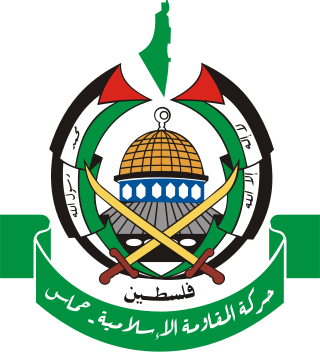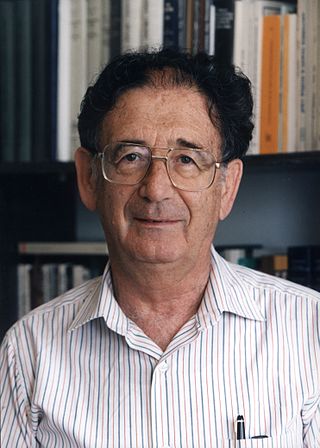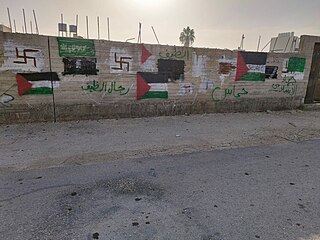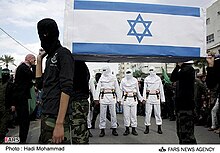
The Islamic Resistance Movement, abbreviated Hamas, is a Palestinian nationalist Sunni Islamist political organisation with a military wing called the Izz al-Din al-Qassam Brigades. It has governed the Israeli-occupied Gaza Strip since 2007.

Yehuda Bauer was a Czech-born Israeli historian and scholar of the Holocaust. He was a professor of Holocaust studies at the Avraham Harman Institute of Contemporary Jewry at the Hebrew University of Jerusalem.
Mahmoud Ahmadinejad was President of Iran from 3 August 2005 to 3 August 2013, and during that time had repeatedly made contentious speeches and statements against Israel. Ahmadinejad refused to call Israel by name, instead calling it the “Zionist regime”. He has called for the "elimination of the Zionist regime". Ahmadinejad took part in a protest called "The World Without Zionism" and has derided Israel on numerous occasions. He has urged regional powers to cut diplomatic and economic ties with Israel and halt oil sales. Tensions have risen over Iran's nuclear program. He has also provided funding, training and arms to Hezbollah and Hamas.

The Islamic Republic of Iran officially recognises Palestine as a state. Ali Khamenei, the Supreme Leader of Iran, rejects a two-state solution and implies that Palestine is inseparable, while Iran's former President Mahmoud Ahmadinejad called for a free referendum for the entire Palestinian population, including Arab citizens of Israel, to determine the type of government in the future Palestinian State, while reiterating that establishment of a Palestinian State alongside Israel would "never mean an endorsement of the Israeli occupation".
In political science, policide describes the intentional destruction of an independent political or social entity. Sometimes, the related word "politicide" is used in this meaning. The term is used with some regularity within political science, generally to refer to a policy of destruction that falls short of genocide or ethnocide.

A bilateral relationship exists between Armenia and Israel. From 1993 to 2007, Armenia was served by the Embassy of Israel in Georgia. In 1996, Tsolak Momjian was appointed the honorary consul of Armenia in Jerusalem. Eleven years later, the residence of the Embassy of Israel in Armenia was moved to Jerusalem. In October 2010, Shmuel Meirom was appointed the Israeli ambassador to Armenia. Armen Melkonian was appointed the Armenian ambassador to Israel in 2012, with a residence in Cairo. In October of that year, Melkonian presented his credentials to Israeli president Shimon Peres. On 21 September 2019 Armenia announced that it would be opening an embassy in Israel. Despite generally cordial ties between the two, relations soured after Armenia withdrew its ambassador to Israel due to Israeli arms supply to Armenia's enemy, Azerbaijan, in the 2020 Nagorno-Karabakh War.
The notion of a second Holocaust is an assertion that the Holocaust or a similar event is recurring or will recur. It is often used to discuss real or perceived threats to the State of Israel, the Jewish people, or the Jewish way of life.
Yunis Al Astal is a preacher and Hamas member of the Palestinian Legislative Council for the area of Khan Yunis. He writes on topics such as Islamic law (fiqh), sociology and politics.

Osama Hamdan (Hamadan) is a former senior representative of Hamas in Lebanon and Tehran. He previously held the position of Head of International Relations Department for Hamas and Chair of the Political Committee of the Palestinian Legislative Council.

The Covenant of the Islamic Resistance Movement, referred to as the Hamas Covenant or Hamas Charter, was issued by Hamas on 18 August 1988 and outlines the organization's founding identity, positions, and aims. In 2017, Hamas unveiled a revised charter, without explicitly revoking the 1988 charter.

Racism in the Palestinian territories encompasses all forms and manifestations of racism experienced in the Palestinian Territories, of the West Bank, Gaza, and East Jerusalem, irrespective of the religion, colour, creed, or ethnic origin of the perpetrator and victim, or their citizenship, residency, or visitor status. It may refer to Jewish settler attitudes regarding Palestinians as well as Palestinian attitudes to Jews and the settlement enterprise undertaken in their name.

Criticism of Israel is a subject of journalistic and scholarly commentary and research within the scope of international relations theory, expressed in terms of political science. Israel has faced international criticism since its establishment in 1948 relating to a variety of issues, many of which are centered around human rights violations in its occupation of the West Bank and the Gaza Strip.

Comparisons between Israel and Nazi Germany occur frequently in the political discourse of anti-Zionism. Given the legacy of the Holocaust, the nature of these comparisons, and particularly whether they constitute antisemitism, is a matter of ongoing debate.

"From the river to the sea" is a political phrase that refers geographically to the area between the Jordan River and the Mediterranean Sea, an area historically called Palestine, which today includes Israel and the Palestinian territories of the occupied West Bank and the blockaded Gaza Strip. The phrase and similar phrases have been used both by Palestinian and Israeli politicians to mean that the area should consist of one state.

The State of Israel has been accused of carrying out a genocide against Palestinians at various times during the longstanding Israeli–Palestinian conflict. Debate on whether Israel's treatment of Palestinians since the Nakba meets the definition of genocide, and whether such actions are continuous or limited to specific periods or events, is ongoing. This treatment has also been characterised as "slow-motion genocide", as well as a corollary or expression of settler colonialism and indigenous land theft.
Following the Hamas-led attack on Israel on 7 October 2023 and the outbreak of the Israel–Hamas war, there has been a surge of antisemitism around the world.
In May 2017 Palestinian political and military organization Hamas unveiled A Document of General Principles and Policies, also known as the 2017 Hamas charter, "new charter", or "current" charter. It accepted the idea of a Palestinian state within the 1967 borders, i.e. comprising the West Bank and Gaza strip only, on the condition that also the Palestinian refugees were allowed to return to their homes, if it is clear this is the consensus of the Palestinians ; but at the same time this document strove for the "complete liberation of Palestine, from the river to the sea", and did not explicitly recognize Israel. The new charter holds that armed resistance against an occupying power is justified under international law.

Allegations have been made that the 2023 Hamas-led attack on Israel constituted a genocidal massacre against Israelis. In the course of the assault, Palestinian militants attacked communities, a music festival, and military bases in the region of southern Israel known as the Gaza Envelope. The attack resulted in the deaths of 1,163 Israelis and foreigners, two thirds of whom were civilians.
Jews and Israelis as animals in Palestinian discourse refers to the language and imagery that are encountered in Palestinian narratives that zoomorphically portray Jews and Israelis as members of non-human species that are considered lowly or loathsome. This kind of dehumanization is commonplace on both sides of the Israeli-Palestinian conflict.

Queer advocacy during the Israel–Hamas war has remained a significantly contentious topic. Many queer people allied themselves with pro-Palestinian causes, especially in protest movements against the ongoing war, against the alleged Gaza genocide. Some pro-Palestinian queers have claimed common cause between Queer liberation and Palestinian liberation, though others have called such movements antisemitic and self-contradictory. Some pro-Israeli queers have complained about feeling excluded from traditionally queer spaces due to pro-Palestinian queer advocacy.



![The Iranian man on the right's headband reads "death to Israel" and Hamid Reza Ahmedabadi's [fa] on the left reads "death to America." Hamidreza Ahmadabadi 07072017.jpg](http://upload.wikimedia.org/wikipedia/commons/thumb/2/2a/Hamidreza_Ahmadabadi_07072017.jpg/220px-Hamidreza_Ahmadabadi_07072017.jpg)













